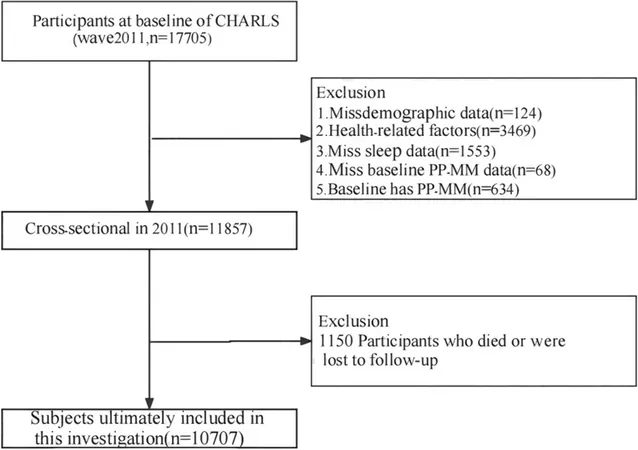
Frailty and Its Alarming Link to Physical-Psychological Multimorbidity in China's Aging Population - What You Need to Know!
2024-12-19
Author: Emily
As the global population ages, the rise of chronic diseases and frailty has emerged as a critical public health crisis. Specifically, in China, an alarming trend is seen in middle-aged and elderly adults, where frailty appears to be increasingly associated with physical-psychological multimorbidity (PP-MM). This fascinating longitudinal study sheds light on these concerning correlations, revealing implications for effective intervention strategies aimed at this vulnerable demographic.
Study Overview
Utilizing data from the extensive Chinese Longitudinal Study of Health and Aging, the researchers examined the relationship between frailty—a condition marked by decreased physiological function and increased vulnerability—and the concurrent presence of both physical illnesses and psychological disorders, termed as PP-MM. The study incorporated 10,707 subjects, adjusting for a multitude of confounding factors using Cox risk regression models, aiming to unearth vital insights regarding the dynamics between these two health concerns.
Findings That Could Change Lives!
After thorough analysis, the results were striking: individuals categorized as pre-frail were found to have a threefold increased risk of developing PP-MM (Hazard Ratio, HR 3.01), while frail individuals exhibited a shocking sixfold increase in risk (HR 6.11). Notably, the relationship demonstrated a nonlinear progression—meaning the risk for developing these conditions escalated significantly when frailty indices (FI) ranged between 0.10 and 0.25.
This suggests that the pre-frail phase may serve as a critical window for intervention, providing a golden opportunity to implement preventative measures against PP-MM.
Why Should You Care?
With a staggering percentage of chronic illnesses among the elderly population—estimates indicate that nearly 25% of those with chronic diseases experience depression—the implications of these findings are substantial. An integrated approach focusing on both physical and psychological health is essential, emphasizing the identification and monitoring of frailty to combat adverse health outcomes.
Insights into the Underlying Mechanisms
The association uncovered in this study could be influenced by inflammatory processes, as frailty is often linked with chronic inflammation, raising the risk for various chronic illnesses. Furthermore, the relationship between physiological decline and psychological distress must be understood to develop cohesive care strategies.
Implications for Future Research and Practice
This research represents a pioneering effort to longitudinally assess the interplay between frailty and PP-MM in a national cohort of Chinese adults. It advocates for incorporating frailty assessments into routine healthcare evaluation for chronic disease patients, thereby enhancing targeted interventions and promoting a better quality of life.
Moreover, it opens new avenues for further investigation into the biological mechanisms linking frailty and multimorbidity, highlighting the need for experimental studies that can solidify these associations.
Conclusion
The findings of this study not only highlight a concerning trend among aging adults in China but also reinforce the importance of early identification and intervention strategies for frailty to combat PP-MM effectively. As the world grapples with the implications of an aging population, recognizing and addressing these health issues will be paramount to ensuring better health outcomes and quality of life for millions.
Stay informed, stay healthy, and remember—the earlier the intervention, the better the chance for a healthier future!



 Brasil (PT)
Brasil (PT)
 Canada (EN)
Canada (EN)
 Chile (ES)
Chile (ES)
 Česko (CS)
Česko (CS)
 대한민국 (KO)
대한민국 (KO)
 España (ES)
España (ES)
 France (FR)
France (FR)
 Hong Kong (EN)
Hong Kong (EN)
 Italia (IT)
Italia (IT)
 日本 (JA)
日本 (JA)
 Magyarország (HU)
Magyarország (HU)
 Norge (NO)
Norge (NO)
 Polska (PL)
Polska (PL)
 Schweiz (DE)
Schweiz (DE)
 Singapore (EN)
Singapore (EN)
 Sverige (SV)
Sverige (SV)
 Suomi (FI)
Suomi (FI)
 Türkiye (TR)
Türkiye (TR)
 الإمارات العربية المتحدة (AR)
الإمارات العربية المتحدة (AR)